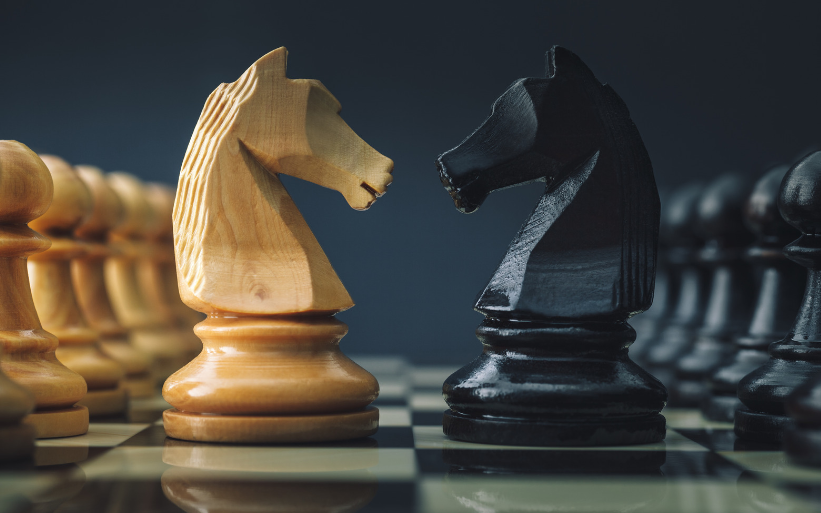If you are a chess player, you are probably familiar with the concept of a chess rating. Your rating is a measure of your strength as a player and is determined by your performance in rated games against other players. Improving your rating can be a long and challenging process, but it is also very rewarding. In this article, we will explore some tips and strategies on your plan for how to improve chess rating.
Understanding the Chess Rating System
Before we get into the tips and ideas for how to improve chess rating, let’s look at how the chess rating system works. The Elo rating system, invented by Arpad Elo in the 1960s, is the most widely used rating system. A player’s Elo rating is determined by their performance in rated games versus other players. A player’s rating rises or falls depending on the outcome of the game and the rating of the opponent. When you defeat a higher-rated opponent, your rating rises more than when you defeat a lower-rated opponent. Similarly, losing to a lower-rated opponent lowers your rating more than losing to a higher-rated opponent.
10 Top Tips & Strategies for Improving Your Chess Rating

Chess is a strategy and skill game loved by millions of players worldwide. There are always methods to enhance your game, whether you are a novice or an expert player. The first step to perfect chess is to improve your problem-solving skills. we will provide you with 10 expert tips from our perfect plan on how to improve your chess rating that will help you take your chess skills to the next level.
1. Master the basics
Mastering the fundamentals is the key to becoming a better chess player. This includes knowing the game’s rules, how the pieces move, and fundamental strategies like checkmate and pins. Once you’ve established a solid foundation, you can start working on more advanced skills.
2. Study famous games
Studying legendary games played by grandmasters is one of the finest methods to develop your chess abilities. You may improve your grasp of the game and build your own playing style by analyzing their plays and techniques.
3. Practice regularly
Chess, like every other talent, takes practice to develop. Set aside some time each day to practice playing, learning, and analyzing games, as well as solving puzzles. Regular practice will help you improve your abilities and become a great player. Doing puzzles can help you to increase your brain power and capacity.
4. Analyze your games
Take the time to analyze each game you play. Look for errors, lost chances, and ways you may have performed better. You may find areas for improvement and work on enhancing those talents by analyzing your games.
5. Learn from your mistakes
Mistakes are an unavoidable part of the learning process, but it is critical to learn from them. When you make a mistake, take the time to figure out why it happened and how you may prevent doing it in the future.
6. Play against stronger opponents
Playing against more experienced opponents is a terrific way to push yourself and develop your abilities. Playing against more experienced players lets you pick up on their techniques and tactics while developing your own playing style.
7. Use chess puzzles to improve your tactical skills
Chess problems are an excellent approach to hone your tactical abilities. You may improve your ability to recognize patterns and predict your opponent’s actions by solving puzzles.
8. Develop a solid opening repertoire
Any chess player must have a strong opening repertoire. You may acquire an advantage in the early stages of the game and set the tone for the remainder of the match by establishing a repertoire of openings.
9. Play with a variety of time controls
Playing with different time controls might help you enhance your overall playing abilities. Playing with longer-time controls can help you build your strategic thinking abilities, but playing with shorter-time controls can help you develop your tactical skills.
10. Join a chess club or community
Joining a chess club or community is an excellent opportunity to meet new players, learn new strategies, and improve your game. You may earn experience and build your own distinct playing style by playing against a range of opponents. Improving your self-confidence and self-esteem by socializing and communicating skills with another player.
Understanding those tips means you are on the right path how to improve chess rating. By following these 10 expert tips, you can take your game to the next level and become a true chess master.
Techniques to Improve Chess Rating

There are many factors that contribute to improving your chess game, including strategy, tactics, opening theory, endgame theory, and much more. In this section, we will provide you with a detailed overview of each of these factors, as well as tips and tricks to help you on how to improve chess rating.
How to improve chess rating: Perfect Chess Strategy
Developing a strong strategy is one of the most crucial parts of chess. This entails analyzing the board and selecting the best line of action based on the actions of your opponent. In chess, you can employ various strategies, such as control of critical squares, piece development, pawn structure, and so on.
Tactics
Tactics are movements and movement combinations that players utilize to gain an edge over their opponents. Pins, forks, skewers, and other similar items fall into this category. Recognizing these strategies and using them to your advantage is an important aspect of enhancing your chess game.
Best chess tactics to improve my chess rating
- Forks: A fork is a tactic in which a single piece attacks two or more of your opponent’s pieces simultaneously. Look for opportunities to create forks, especially with your knights, as they are particularly effective in this type of tactic
- Pins: A pin is a tactic in which one of your pieces attacks an enemy piece that cannot move without exposing a more valuable piece behind it. Look for opportunities to create pins, especially with your bishops and rooks.
- Skewers: A skewer is a tactic in which a more valuable piece is attacked through a less valuable piece in front of it. Look for opportunities to create skewers, especially with your bishops and queens.
- Double attacks: A double attack is a tactic in which a single piece attacks two or more of your opponent’s pieces, forcing them to choose which one to save. Look for opportunities to create double attacks, especially with your bishops, knights, and queens.
- Discovered attacks: A discovered attack is a tactic in which a piece moves out of the way, revealing an attack by another piece behind it. Look for opportunities to create discovered attacks, especially with your bishops, knights, and rooks.
Back rank mates: A back rank mate is a tactic in which the opponent’s king is trapped on the back rank and checkmated by a rook or queen. Look for opportunities to create back-rank mates, especially in the endgame.
Opening Theory
The opening movements are the first few moves of the game, and they set the tone for the remainder of the game. Learning the opening theory is vital since it allows you to plan out the rest of the game. In chess, there are several openings to choose from, each with its own set of advantages and disadvantages.
Best chess opening to enhance my chess rating
- Sicilian Defense: This is a popular and aggressive opening played by Black that involves the moves 1.e4 c5. It is known to create complex and tactical positions on the board, making it a great choice for players who like to play dynamically.
- Ruy Lopez: This is a classical and solid opening played by White that involves the moves 1.e4 e5 2.Nf3 Nc6 3.Bb5. It is known for its strategic and positional nature, making it a great choice for players who like to play patiently and build up their positions.
- French Defense: This is a solid and defensive opening played by Black that involves the moves 1.e4 e6. It is known to create positions with locked pawn structures, making it a great choice for players who like to play positionally and defensively.
- Queen’s Gambit: This is a classical and positional opening played by white that involves the moves 1.d4 d5 2.c4. It is known for its ability to control the center of the board and create strong pawn structures, making it a great choice for players who like to play strategically.
Endgame Theory
The endgame is the game’s last phase, and it might be the most challenging. Learning how to utilize your pieces to achieve checkmate as well as how to defend against your opponent’s moves is part of endgame theory. There are several ending scenarios that you may confront, each requiring a distinct approach.
Conclusion
In conclusion for our ultimate guide on how to improve chess rating. Improving your chess rating takes time and effort, but it is a worthwhile pursuit. By studying the basics of chess, analyzing your games, practicing regularly, playing against stronger opponents, and using chess software, you can improve your rating and become a stronger player. Remember to stay positive and enjoy the process, and you will
FAQs
Consistent practice is essential for improving your chess rating. It’s unlikely that you will see significant improvement without regular practice.
The time it takes to improve your chess rating will vary based on your starting skill level and the amount of effort you put into practicing and studying. It’s important to remember that improvement is a continuous process, and it may take several months or even years to see significant improvement.
While it’s important to understand the basic principles behind different openings, it’s not necessary to memorize specific variations. Instead, focus on understanding the ideas and themes behind each opening and adapting your play accordingly.
While it may be more comfortable to play against weaker opponents, it’s unlikely to result in significant improvement in your chess rating. It’s important to challenge yourself by playing against stronger opponents to expose yourself to new strategies and techniques.
Setting goals for yourself and tracking your progress can help you stay motivated. You can also join a chess club or find a practice partner to keep you accountable and provide feedback.
While there are many resources available online for free, investing in chess books or courses can be beneficial. They provide structured learning and can expose you to new ideas and strategies that you may not have discovered otherwise.

